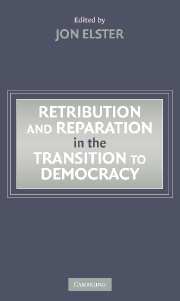Book contents
- Frontmatter
- Contents
- Contributors
- Preface and Acknowledgments
- 1 Introduction
- PART I GENERAL ISSUES
- PART II GERMANY AND GERMAN-OCCUPIED COUNTRIES AFTER 1945
- PART III LATIN AMERICA, POST COMMUNISM, AND SOUTH AFRICA
- 9 Paranoids May Be Persecuted: Post-totalitarian Transitional Justice
- 10 Transitional Justice in Argentina and Chile: A Never-Ending Story?
- 11 Transitional Justice in the German Democratic Republic and in Unified Germany
- 12 Rough Justice: Rectification in Post-authoritarian and Post-totalitarian Regimes
- 13 Truth and Reconciliation Commission in South Africa Amnesty: The Price of Peace
- 14 Conclusion
- Index
- References
12 - Rough Justice: Rectification in Post-authoritarian and Post-totalitarian Regimes
from PART III - LATIN AMERICA, POST COMMUNISM, AND SOUTH AFRICA
Published online by Cambridge University Press: 03 December 2009
- Frontmatter
- Contents
- Contributors
- Preface and Acknowledgments
- 1 Introduction
- PART I GENERAL ISSUES
- PART II GERMANY AND GERMAN-OCCUPIED COUNTRIES AFTER 1945
- PART III LATIN AMERICA, POST COMMUNISM, AND SOUTH AFRICA
- 9 Paranoids May Be Persecuted: Post-totalitarian Transitional Justice
- 10 Transitional Justice in Argentina and Chile: A Never-Ending Story?
- 11 Transitional Justice in the German Democratic Republic and in Unified Germany
- 12 Rough Justice: Rectification in Post-authoritarian and Post-totalitarian Regimes
- 13 Truth and Reconciliation Commission in South Africa Amnesty: The Price of Peace
- 14 Conclusion
- Index
- References
Summary
This chapter examines positive transitional justice, how and why post-authoritarian and post-totalitarian democratic governments legislate and proceed with the transfer of property, money, or less tangible goods such as honors, jobs, and other privileges to persons legally recognized as entitled to compensations for acts that were committed in an organized fashion on behalf of previous nondemocratic regimes. Those entitled may have lost easily quantifiable assets such as movable and immovable property, or less quantifiable goods such as years of their life, jobs, health, or family members.
Rectification may be divided into compensation for losses in personam, such as loss of time (in prison, barred from practicing one's profession, etc.), and restitution in rem, which attempts to rectify the loss of property. Restitution may be divided into natural, when lost property is returned to its original owners or their heirs in the form it has acquired by the time of restitution, and restitution in kind, when owners or heirs receive similar property or financial compensations.
Restitution in this sense should not be confused with the standard legal and occasionally philosophical use of restitution as “the correction of unjust enrichment.” In the post-totalitarian context, the loss of one person does not necessarily or even often result in the equal or greater enrichment of others. This is obvious in the case of losses in personam such as the loss of years in the gulags. The imprisonment or professional banishment of qualified workers resulted in net loss for the economy with no corresponding gain.
- Type
- Chapter
- Information
- Retribution and Reparation in the Transition to Democracy , pp. 276 - 298Publisher: Cambridge University PressPrint publication year: 2006
References
- 2
- Cited by



